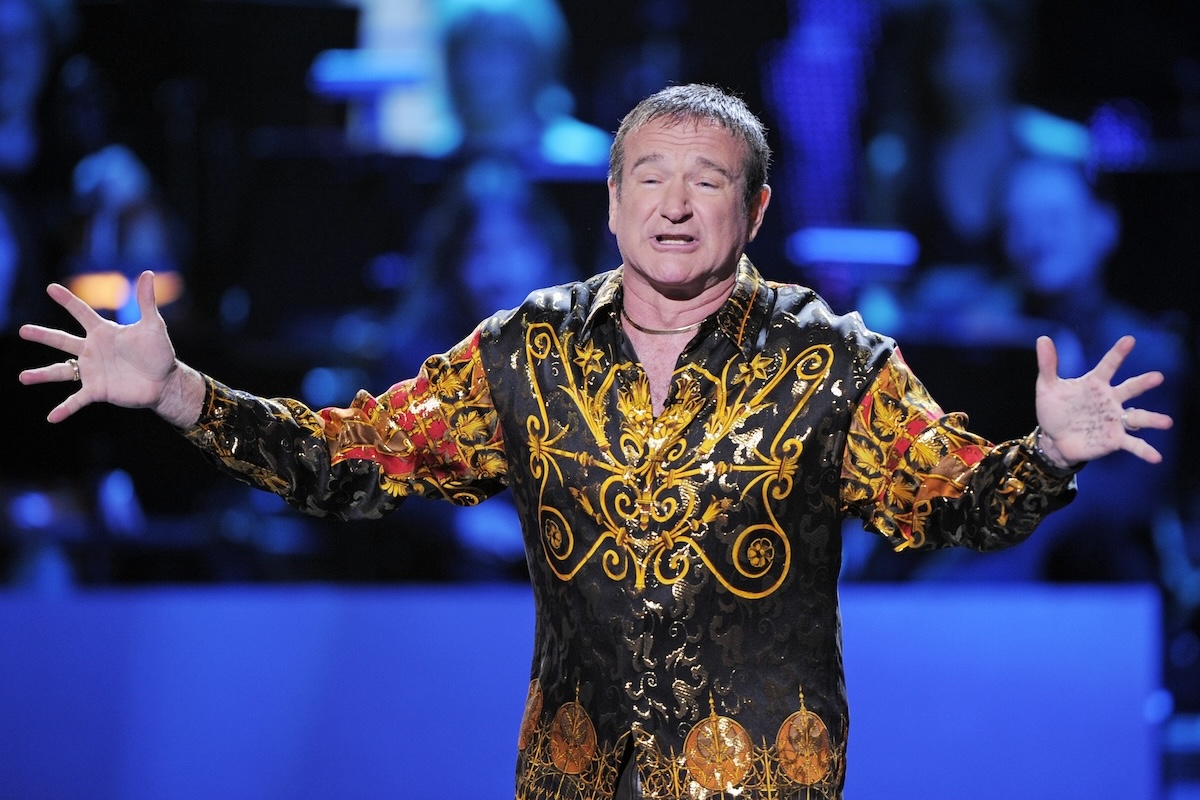This August 11 is the 10th anniversary of the death of Robin Williams, the most beloved comedian to come out of the new America unleashed by the ’60s, entertaining the country for more than 40 years through a number of changes in genre and medium. Williams was distinctive because he showed us that he was crazy and we recognized ourselves in his act: being American is being crazy. That’s how we live, and he made it seem fun, even glamorous, given the success that followed on his exuberance and his shameless abandon of every propriety or restraint. In our hearts, we would like to rebel. Moreover, his craziness was full of vitality and seemed something we could all be part of. We wanted to believe him because we’re afraid of dying. He made our crazy lives look like they could expand to include anything, everything, and there would never be a price to pay. We didn’t look behind the curtain—we believed the surprises would always be delightful. Then Robin Williams committed suicide, and we were mostly shocked.
These contradictions define Williams’ legacy as they define our way of life, and they therefore bear examining. The best place to start is the HBO two-hour documentary on his life and career, Robin Williams: Come Inside My Mind. It’s unusually well done while remaining within the boundaries of this age of the twilight of the Boomers. There is no judgment, the one thing we do not allow in America, but the documentary gets sadder in its second half, intimating that life is not all excitement, that for all the American promise, there are disappointments, too. I guess the pieties brought out by the tricks of the documentary trade—the pauses, silences, long shots and lamenting music—are intended to calm our fears.
For all the advantages of examining a man’s life in its entirety, to say nothing of having access to all the people and documents, I admit, there is a downside to this nonjudgmental, therapeutic ethic. First, the documentary works hard to suggest that the unhappy end was all too predictable—but then shouldn’t someone have done something? Secondly, it starts and ends with the assurance that Williams’ death was a medical issue (Lewy body dementia) beyond human control—he didn’t really kill himself. Rather, it’s like when you get cancer, an alien trouble. Thirdly, the spirituality-but-not-religion: his ashes were spread in the San Francisco Bay where he lived his life, according to his wishes; then his son swam there with a friend of the family, feeling his father’s presence all around; underwater shots of the bay…
Comedy and Fear of Death
Well, we should be at least as brave as Williams was—after all, the energy of his performance was contagious. The documentary lacks that bravery; it is intended to soothe fear of death—someone has to explain it away for us, with copious dollops of sentimentality thrown in. This does Williams a disservice; he really did try his hardest to be America, not just to be loved by America, but to embody American freedom and live it to the full. He certainly embodies our twin drives. First, to go out there, with a positive attitude, and have success and make people feel good, to be loved and liked and respected and unforgettable, too, and to get as much out of life as possible—because you get only one life and you never know when you might die. Secondly, to shut down, shut up, to hide, to be quiet, to get some catatonic release (let’s call it Zen) from a frantic world so full of uncertainty where nothing ever lasts. But that was his private life, and we did not know it at the time.
Come Inside My Mind shifts constantly between Williams’ public and private lives, sometimes achieving a coherence of vision that restores to us the man, not just the performer, other times reducing him to a caricature of America: now manic, now depressive, now extravagantly rich and vital, now boringly banal, now excited about new possibilities, now retreating into suburban, rural, or nature-worshiping simplicity and quiet. Here he is partying with the biggest stars in Hollywood—there he goes raising goats on a farm. The result for some will be a kind of adventure not too different from gossip, which our media has long specialized in; but others will see the story of a lonely man who didn’t really have friends, trust, or advice—that’s the real indictment of the glamor industry. The few interventions by his friends shown in the film are also the only morally serious judgments, in restrained, kind ways. They offer a welcome contrast to the praise we all expect. On the other hand, his experience of Christianity is absent from the picture.
Williams was a lonely boy in the midst of midcentury wealth. Born in 1951 to a father who was a Ford executive who sent him to an expensive boarding school, he got his sense of humor from his Southern belle mother, who was nevertheless neglectful. He tells a touching story of seeing his father laugh at Jonathan Winters’ routines on Johnny Carson and wanting to have that kind of effect on his father, too. It seems he yearned to please, to make people wonder at him.
Then at the end of the ’60s, the dedicated, dutiful student-athlete with a penchant for drama turned into the unfolding spectacle of freedom. He wasn’t quite wild—he got a scholarship to and attended Julliard. But he fell in love with San Francisco and lived that life. To understand the lovable, made-for-TV, family-friendly Williams, look to Ken Kesey and the Merry Pranksters, America’s own LSD cult, the subject of Tom Wolfe’s Electric Kool-Aid Acid Test (1968). That religion of freedom included the childish jester busy with the histrionics of artistic improvisation, but also drugs and sexual promiscuity. It was the ’70s, which, as a nation, we seem to have chosen to forget, and, as I said, we do not judge in America. We should nevertheless be grateful that Wolfe reported from the scene and we can now remember.
Williams was manic, but the flipside was occasionally on display in his movie career, in convincing performances as men who died inside—that’s the death toll for the experience of freedom with law. Williams himself cleaned up when he learned John Belushi died—he had been with him, partying, the night he overdosed. Belushi was another star fabled for his energy, exploration of chaotic freedom, and overpowering personality.
In surviving the friend who most resembled him, Williams began his transformation into the avuncular figure we remember. Perhaps we can admit we ended up seeing authority in him, in his manly strength, his deep and powerful voice, his self-restraint—he had had experience and the luck or skill to have survived it all. That was his Oscar-winning role in Good Will Hunting, for example. Hence, also, his most patriotic work doing USO Tours to entertain the troops.
This older, wiser man, beaten but still alive, knew what we has talking about, had things to say, and was captivating to watch. He was no longer an oddity on TV, a youngish clown, a figure of ridicule, but the man who brought us the results from the longest national experiment in the wilderness. We listened to him often talk about his life in stand-up comedy and never noticed how he had spent four decades concealing in his silly jokes serious insights into how messed up we are. I think we owe it to him to see that in a way he suffered for our sake. In that sense, celebrity is a lot more like the burdensome obedience to a command than it is easy living.
The Dignity of the Comic Art
Williams had a head on his shoulders, which we see for the first time in Come Inside My Mind. We were impressed with the man and his act, so we never listened to him. This is, strangely enough, helpful—instead of getting docu-wisdom and self-help or made-for-TV therapy, we get to hear what he was actually saying on stage and really listen to his jokes. It is not just his hedonistic excesses—there are many parts of American life he threw himself into with abandon and came back to give us the news, somewhat wiser and usually smart enough to conceal his hard-bought wisdom in jokes. The meaning of his all-American comedy was: “Count your blessings.”
In America much is promised, but nothing guaranteed. To prove our individuality is worth something, we need success in society, but to defend it, we need to escape into seclusion. For a long time, Williams pulled off this act, keeping his secrets from us, helping us admire him. He inspired in us the thought that we are worth inspiring. He started out a shy child, but he ended up understanding America’s juvenile pop culture and tried to play the role of the grown-up. We need documentaries and criticism because we do not take seriously what we find laughable. We have to grow up—we already know Williams was a talented comic, but we have yet to learn what talent is all about, why it has a national dimension.
In middle age, Williams took up biking long distance, one assumes, to get away from it all. This is the image that stuck with me from Come Inside My Mind, always moving but also staying in place, making the best of restlessness, trying to prove strength. You might think it Sisyphean, but striving is also pleasant. Maybe think of him as an American after the closing of the frontier, nature conquered, the bike replacing the horse, going up and down the California coast contemplating the endless ocean. Williams was more extravagantly the life of the party than we are—he was, of course, also more catatonic than the rest of us. We have to mix our love for him with an understanding that it’s our fantasies he was chasing. We bear some responsibility for our celebrities.

